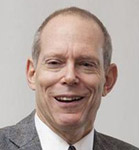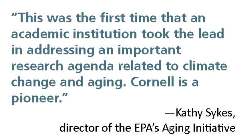By Ted Boscia, reprinted from Cornell Chronicle, November 19, 2010
 Karl Pillemer, the Hazel E. Reed Professor in the Department of Human Development, will receive the M. Powell Lawton Award from the Gerontological Society of America (GSA) at its annual meeting Nov. 19-23 for his work on improving the lives of older adults in nursing homes and community settings.
Karl Pillemer, the Hazel E. Reed Professor in the Department of Human Development, will receive the M. Powell Lawton Award from the Gerontological Society of America (GSA) at its annual meeting Nov. 19-23 for his work on improving the lives of older adults in nursing homes and community settings.
The award recognizes Pillemer's work in three areas: preventing elder mistreatment by staff and other residents in nursing homes; improving the work life of qualified certified nursing assistants (CNAs); and strengthening relationships between the families of residents in long-term care and CNAs.
He has designed such interventions as workshops to ease communication between CNAs and families, a program to train and retain CNAs and epidemiological studies to determine the prevalence and causes of elder abuse.
"For people in nursing homes, the quality of relationships with staff and the care delivered defines the entire experience," said Pillemer, associate dean for extension and outreach in the College of Human Ecology. "If we can better support CNAs -- who deliver about 90 percent of the direct care -- and give families more tools to care for their loved ones, residents will have a better quality of life."
Pillemer is a GSA fellow, the society's highest class of membership, and serves as a member-at-large for its Behavioral and Social Sciences Section. At Cornell, he co-directs the Cornell Institute for Translational Research on Aging, a National Institutes of Health-funded center to work with community and academic partners to improve elder care.





